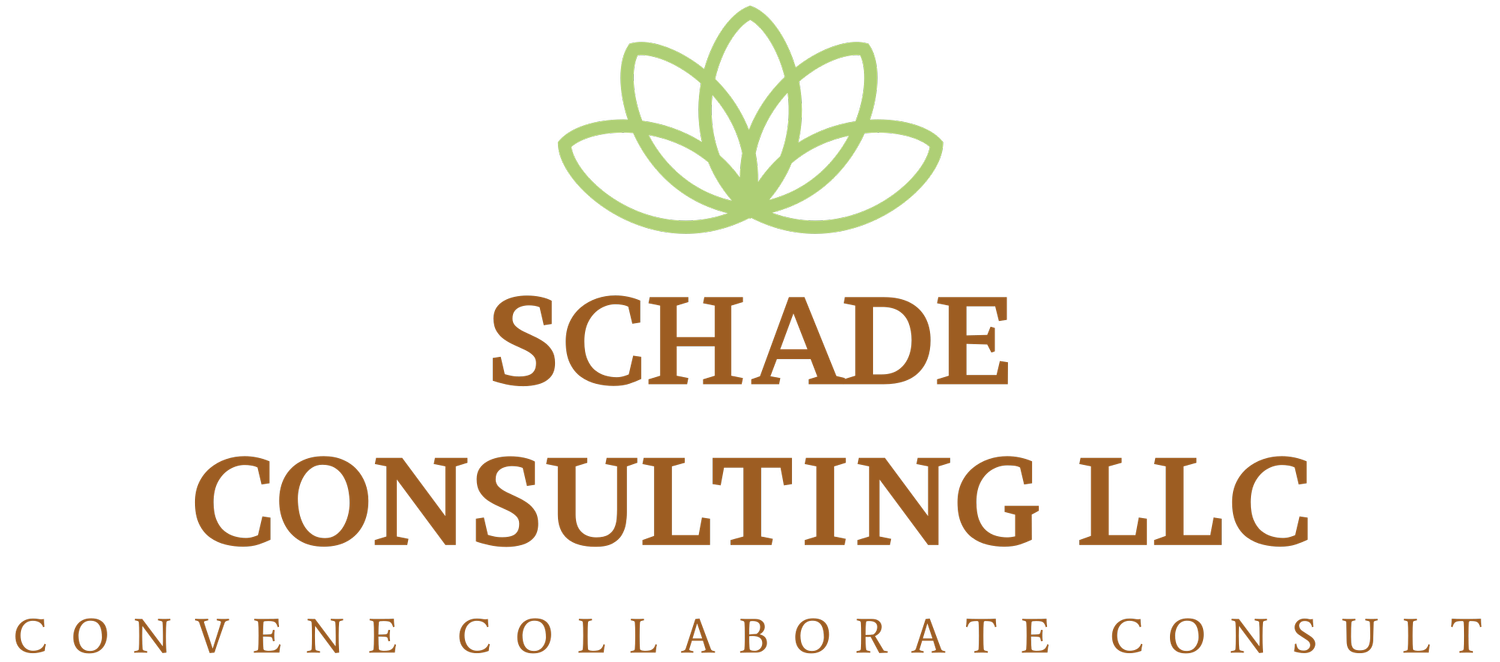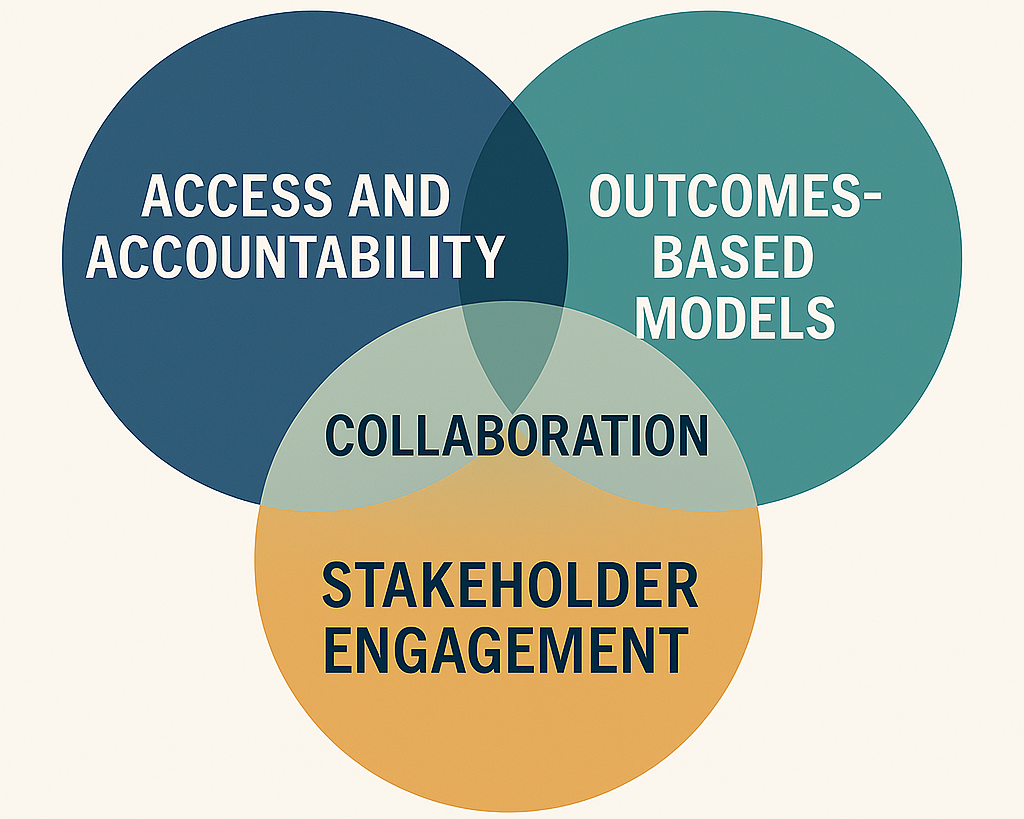9/9/25
Cutting Through the Noise: How our Return on Relationship Framework Helps Educators and Employers Navigate Workforce Development Chaos
If you’re an educator, employer, or workforce development professional, trying to make sense of today’s workforce development landscape, you’ve likely felt buried under a mountain of acronyms, shifting policies, and well-meaning—but often disconnected—initiatives. From Skills First hiring to new federal guidance, Apprenticeships, and work-based learning, as well as the digital transformation within credential transparency, the pace of change is dizzying. And the volume of communication? Deafening.
At Schade Consulting, we don’t just help you decode the system. We help you align within it—using our Return on Relationship framework to turn complexity into clarity, and convenings into catalysts for change.
The Problem Isn’t Just Volume—It’s Fragmentation
Every stakeholder has a message. Every agency has a toolkit. Every initiative has a webinar. But for those on the ground—community/technical colleges, workforce boards, HR leads, training providers—the result is often paralysis, not progress.
Educators are asked to align curriculum with evolving skills taxonomies, labor market data, and equity-centered funding models.
Employers are urged to adopt skills-based hiring, engage with regional talent pipelines, and report outcomes to multiple agencies.
Workforce Intermediaries are trying to stay abreast of policy to advocate and align.
The system isn’t lacking effort. It’s lacking alignment.
The Return on Relationship Framework: A Compass in the Chaos
Our Return on Relationship framework is built on three pillars: Trust, Collaboration, and Measurable Impact. It’s how we help stakeholders move from reactive to strategic—together.
1. Trust: Clarify Roles and Reduce Noise
We can start by mapping the ecosystem. Who’s speaking? Who’s listening? Who’s affected?
- By identifying the most relevant policies, platforms, and partnerships for each stakeholder, we reduce information fatigue and build trust through transparency.
2. Collaboration: Translate Policy into Practice
We can help tailor communication to each audience, translating complex guidance into actionable steps.
- Whether it’s a visual explainer for educators or a skills-first hiring checklist for employers, we make sure everyone’s speaking the same language.
3. Measurable Impact: Align on Outcomes, Not Just Activities
We can help stakeholders define success beyond compliance—focusing on learner outcomes, hiring equity, and community impact.
- This means co-designing metrics that matter and building feedback loops that drive continuous improvement.
Example: For a regional workforce board, we facilitated a cross-sector convening that led to shared goals around transparency and employer engagement.
What You Can Do Today: Simplify Your Own Approach
Whether you're an educator, employer, or workforce intermediary, you can start simplifying your approach today by applying the principles of Trust, Collaboration, and Measurable Impact—the core of the Return on Relationship framework.
Curate What Matters
Instead of reacting to every policy update or stakeholder email, build a system that filters for relevance.
Create a “signal vs. noise” folder in your inbox to separate FYI updates from actionable items.
Subscribe to one or two trusted newsletters that summarize federal and state workforce developments.
Use a shared doc or Slack channel to crowdsource key takeaways with your team or coalition.
Tip: Ask yourself, “Does this impact my learners, my hiring practices, or my funding?” If not, archive it.
Define Your Role in the Ecosystem
Clarify where you sit—and what’s within your control.
Educators: Map your curriculum to one or two skills frameworks (e.g., NIST, Credential Engine) and align with local employer needs.
Employers: Start with one department or role to pilot skills-based hiring. Document what works and share it internally.
Workforce Boards: Facilitate a quarterly check-in with training providers and employers to align priorities.
Tip: Don’t try to do it all. Focus on what’s closest to your mission and build outward
Build Relationships That Matter
You don’t need a formal convening to foster collaboration (but it would be encouraged for future impact). Start small.
Reach out to one peer institution or employer to compare notes on Skills First implementation.
Host a virtual coffee chat or LinkedIn Live to share lessons learned.
Create a shared Google Sheet to track regional initiatives, funding opportunities, or policy changes.
Tip: Relationships thrive on consistency. Even informal check-ins can build trust over time.
Use Social Media to Educate and Mobilize
Your voice can help others navigate the system. Use it strategically.
Post reflections on what’s working (and what’s confusing) in your workforce development journey.
Share visuals or quotes from recent convenings, webinars, or policy briefs.
Tag relevant agencies, coalitions, or partners to amplify reach.
Sample post: “We’re piloting skills-based hiring in our customer service team. Early results show stronger retention. Curious how others are approaching this—let’s connect.”
Make Your Newsletter a Tool for Alignment
If you send a newsletter—internally or externally—use it to build clarity and connection.
Include a “Policy Pulse” section with 2–3 key updates and why they matter.
Spotlight one partner or initiative that’s driving measurable change.
Share metrics or stories that reflect impact, not just activity.
Tip: Keep it short, visual, and actionable. Your newsletter should feel like a roadmap, not a report.
You can shift from reactive to strategic—without waiting for perfect conditions or external support. Trust, collaboration, and impact aren’t just ideals. They’re tools you already have.
Let’s Turn Convenings into Catalysts
The future of workforce development isn’t just about policy—it’s about relationships.
At Schade Consulting, we help you build the ones that matter.
Ready to align your efforts and lead with clarity? Let’s talk.
🤝 Advancing System Alignment: The Power and Pitfalls of Collaboration in Workforce Development
A Perspective from Schade Consulting LLC on Workforce Pell, Workforce Realigned, and Stakeholder Engagement
At Schade Consulting LLC, we believe that workforce development is most effective when it’s relational, inclusive, and outcomes-driven. As new policies like the Workforce Pell and frameworks like Workforce Realigned reshape the landscape, we see an opportunity to deepen collaboration while honoring the time, trust, and experience of stakeholders.
✅ The Promise of Collaboration
Co-Creation Builds Relevance
We’ve seen firsthand that when educators, employers, and community partners co-design strategies, the resulting programs are more aligned with real-world needs and more resilient to change.
Workforce Pell Expands Access
By extending Pell Grant eligibility to short-term training programs, this law opens new doors for learners seeking economic mobility. It also challenges institutions to rethink how they deliver career-connected education in partnership with employers (source).Relational Impact Drives Sustainability
At Schade Consulting, we use Return on Relationship (ROR) metrics to capture the value of trust, transparency, and shared purpose—especially as stakeholders navigate new funding models and accountability structures.
⚠️ The Tensions We Must Navigate
Stakeholder Fatigue Is Real
When engagement feels extractive or unfocused, participation can diminish. We’ve seen this in convenings where roles are unclear or outcomes are delayed.Competing Priorities Across Systems
Workforce Pell and Workforce Realigned demands alignment between short-term training, long-term career pathways, and employer needs. Without intentional facilitation, these priorities can clash.Resource Strain and Power Imbalances
Inclusive engagement takes time—and without equitable design, some voices may be sidelined. We advocate for engagement mapping and capacity-aware strategies to ensure all stakeholders are heard.
📊 Workforce Realigned: Investing in What Works
Understanding what works and what does not will help identify which investments will deliver the most impact. Also referenced in Forbes: Stop Paying for Failure
The release of Workforce Realigned, Volume II, marks a pivotal shift in how workforce development is financed and evaluated. This collection of 21 case studies—authored by policymakers, employers, educators, and practitioners—spotlights outcomes-based models that tie every dollar to measurable, sustained economic gains.
Key innovations include:
Apprenticeship pay-for-success programs
These models shift risk away from workers and toward institutions, ensuring that funding is contingent on employment outcomes.
Employer-Led Training Initiatives
Employers co-invest in programs, aligning curricula with labor market demand and improving placement rates.Shared Accountability Structures
These frameworks foster deeper collaboration and incentivize long-term success across sectors.
At Schade Consulting, we see these models as a natural extension of ROR principles—validating relational investments and reinforcing the importance of trust in driving measurable impact.
🔄 Reinvigorating Engagement
To sustain energy and avoid fatigue, we recommend:
Designing for Impact, Not Just Input
Engagement should lead to visible change—whether in program design, policy shifts, or learner outcomes.Using ROR Metrics to Track Relational Value
These tools help stakeholders see the impact of their time and trust, beyond traditional KPIs.Tailoring Engagement to Capacity
Not every stakeholder needs to be at every table. Strategic mapping helps distribute effort and protect bandwidth.Building in Recovery Space
Engagement cycles should include reflection and renewal—especially in fast-evolving contexts like Workforce Pell implementation.
🔗 A Visual Guide to Alignment
To illustrate how these elements intersect, we created a visual roadmap connecting Workforce Pell, Workforce Realigned, and stakeholder engagement:
In this Venn diagram:
Workforce Pell and Stakeholder Engagement overlap on access and accountability
Stakeholder Engagement and Workforce Realigned meet on outcomes-based models
All three converge at collaboration, the driving force behind sustainable impact
At Schade Consulting LLC, we remain committed to helping partners navigate this evolving terrain with clarity, creativity, and care. Whether you're redesigning programs, facilitating cross-sector partnerships, or measuring relational impact—we’re here to support the journey. We understand the complex environment the ecosystem faces, and we know one size does not fit all. Let us design a strategy that speaks directly to your priorities.
Welcome to Schade Consulting: Where Relationships Ignite Real Change 🔥
At Schade Consulting, we believe that every gathering holds the potential to spark something extraordinary.
We don’t just convene people—we design purposeful experiences that inspire creativity, honor every voice, and transform dialogue into collective action. Whether we're facilitating community workshops, guiding strategic planning sessions, or supporting workforce transformation, we center human connection in everything we do.
Why We Exist
Our work is grounded in a core belief we call Return on Relationship (ROR)—the idea that the true measure of success isn’t just what gets done, but how people feel along the way. When relationships are strong, collaboration becomes deeper, outcomes more meaningful, and impact longer lasting.
How We Collaborate: A Flow that Builds Trust and Multiplies Impact
We approach collaboration as a deliberate and evolving process—what we call the Value Creation Flow. It’s more than a framework; it’s a living cycle that starts with deep listening and ends with amplified impact. Here’s how it shows up in our work:
Authentic Convening
We create inclusive spaces where stakeholders—from students to CEOs—feel seen, heard, and safe. These are not just meetings; they’re launchpads for trust and relational momentum.Collaborative Innovation
We guide co-creation across roles and sectors, breaking silos and building shared ownership. Ideas don’t come from the top—they emerge from the middle, the margins, and the lived experiences in the room.
Actionable Strategy
We translate insights into strategy, with an eye on implementation and accountability. Trust is not a byproduct—it’s a driver. When people trust the process, they invest in the outcomes.Measurable Impact
We help partners track what truly matters: belonging, engagement, equity, and transformation. These are the proof points of relational return—and the fuel for future gatherings.
This flow isn’t static. It loops forward—strengthening networks, reinforcing relationships, and turning each touchpoint into a foundation for more resilient systems.
Our Vision
We envision a world where collaboration is courageous, facilitation is community-centered, and strategy is driven by people—not just plans. A world where every convening is a catalyst for creativity, connection, and change that lasts.
Our approach to consulting is human-focused with a sense of building value for the return on relationship. Success in the Value Creation Flow is rooted in relationships—but it’s not just a “feel-good” notion. At Schade Consulting, you’re translating trust into tangible outcomes. Here’s how success shows up across each stage of the flow, with both qualitative and quantitative markers:
📍 1. Authentic Convening
💡 2. Collaborative Innovation
🔧 3. Actionable Strategy
📈 4. Measurable Impact
Let us Convene | Collaborate | Consult with your team! We look forward to continuing this conversation—amplifying insights, sharing real-world models, and co-creating a Skills Economy that works for everyone.
Contact Sarah Schade, Owner/Chief Consultant at sarah@schadeconsultingllc.com

